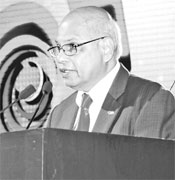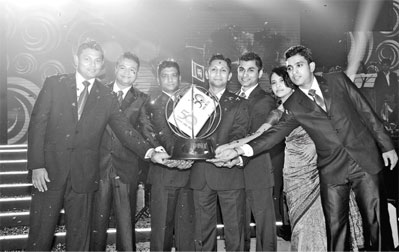DSI projects new vision at 50th anniversary
A young man from Galle gets a job in a shop selling 'Good Year' tyres
in Pettah and comes to Colombo. Even though the pay was meagre, he makes
an effort to save a little money. When it was sufficient to start a
little business, he begins to sell 'sudu redi' - white cloth, which was
a scarce commodity at the time. World War II had just begun - in 1939.
 |
|
Chairman DSI Samson
Group
Dr D.S. Rajapaksa |
Having met a group of Tamil businessmen who imported goods from India
via Velvetithurai, he starts going to Jaffna a couple of times a month,
brings the cloth and starts selling on the pavements in Colombo.
Carrying a bundle of cloth on his shoulder, he moves from place to
place. It is tough going, yet he is so persevering.
With sales improving, he gets a
nephew to assist him. They move one step further - they erect a
makeshift rack between the walls of an oil boutique and a dry fish
outlet at Fifth Cross Street-Price Street junction and start selling
textiles. As business improves the young man looks for a little shop and
finds one in First Cross Street.
The Japanese air raid on April 12, 1942 forces the young man to
abandon Colombo and get back to his native village Bataduwa. Back in
Colombo when things settled down, he resumes business. Keen to expand
the business he borrows Rs 250 from a chettiyar at an interest of two
rupees per day. (It was increased to five rupees later).
Hearing of a place at Dias Place turning out shoes as a cottage
industry, he offers to sell them at his shop on the understanding that
the money would be paid after the shoes are sold. The business gradually
grows and the sales staff increases to eight.
This is the beginning of the success story of Samson Mudalali - the
founder of DSI, a leading footwear manufacturer and distributor in Sri
Lanka today.
Diyanuge Samson who lost his parents when he was a child, was a
self-made man who had confidence in himself. Hard work and honesty were
the secret of his success.
He started importing shoes and at the same time set up a little
'factory' at Kaapiri Mudukkuwa in Pettah to make shoes.
With the restrictions imposed on imported products in 1962, he
successfully negotiated with his Japanese business contacts to
manufacture shoes in Sri Lanka. Machinery was imported and a workshop
was set up in Galle. There was no electricity in the village at that
time and the machines were run on a generator.
The range of products gradually widened - starting with ladies
Ballerina shoes to slippers and children's shoes. Vehicles were bought
to distribute the products throughout the country. The factory was
expanded to manufacture other products as well - the first being
travelling bags. Suitcases and brief cases were introduced later.
Having got married at the right age, Samson Mudalali brought up a
well knit family with five sons and three daughters who, in due course,
were groomed to take over the business. He promoted the sons to work
with him during their university holidays thus providing them with an
opportunity to familiarise themselves with the business.
DSI was established in Galle in May 1962 - Samson Mudalali's 50th
birthday. After their graduation, the sons joined the business. The
arrival of the second generation marked the beginning of a trend of
modernisation.
 |
|
Third generation
directors celebrate 50th anniversary |
A trip to Japan by the father and son Kulatunga gave them an
opportunity to study operations at the Nishin Rubber factory and at the
end of the week-long visit the owner offered the old machines which they
gladly accepted.
DSI was expanding. With the enactment of the Business Acquisition
Act, for fear of a possible takeover it was felt safe to re-name some of
the companies handling different businesses. Thus Rajapaksa Engineering
Works (fabricating and maintaining machinery), Taiyo Rubber Products
(making shoes) and Galle Packaging (manufacturing wooden boxes for
export) were born. Once the Act was repealed, these companies were
renamed again as Samson Engineering Works and Samson Manufacturers.
Exports to Saudi Arabia was a big breakthrough as a result of the
Israeli war.
The second generation saw the need for diversification. A garment
factory was opened with Japanese and Koreans providing the expertise.
With joint ventures being the order of the day after the liberalisation
of the economy in 1977, DSI set up Lanka Polymer Limited as a BOI
project in association with the Fiji buyer who was buying rubber
products from BOI. Samson Exports Ltd concentrated on exports.
Since the 1980s the expansion has been rapid. Showrooms have been set
up in key towns. Factories have been modernised with state-of-the- art
facilities. Local and international awards have been won. The product
range expanded.
DSI has not looked back and today there are 29 companies in the
Group. Samson Mudalai's sons give the lead in managing the entire
operation.
Meanwhile, DSI has not forgotten the community. Through numerous CSR
projects, DSI maintains a close link with the community.
The second generation has strengthened the company making DSI a
household name in Sri Lanka and capturing market leadership in the
footwear industry. The third generation is gradually moving in to take
the business to further heights.
To mark the 50th anniversary of the DSI group, the new vision is
'Local to Global' .
There are two main categories of DSI products which have been the
main contributors.
The first is the core business - footwear. DSI claims more than 60
percent market share in the local market and the product range is being
exported to more than 40 countries.
Specifically manufactured product ranges are sent to specific regions
including Europe. The second category is tyres and tubes. Their products
account for more than 70 percent of the local market share . Currently,
these products are being exported to more than 60 countries.
The export business of these two categories has grown significantly
over the years. In addition, the other product export businesses too
play a vital role in achieving the global vision.
Over the past 50 years , the first and second generations have been
instrumental towards the success and the market leadership the Group
enjoys today.
They have been able to convert the single business entity in to a
conglomerate in keeping with the founder chairman's corporate
philosophy.
The task of the third generation will be to firmly establish the DSI
brand in the region, increase its global presence and move forward
diligently.
As DSI celebrates fifty years from the day it was established in
Galle, it has 29 companies in the Group. The key companies are DSI
Samson Group (Chairman Dr D S Rajapaksa and Managing Director Kulatunga
Rajapaksa), D Samson and Sons (Pvt) Ltd (Chairman Nandadasa Rajapaksa)
and D Samson Industries (Pvt) Ltd ( Jt Managing Director Kasun
Rajapaksa).
The other second generation directors are D.N Rajapaksa, D. M
Rajapaksa, D.R Rajapaksa, and D.A Rajapaksa.
The third generation directors are D.T.R Rajapaksa, D.D.K Rajapaksa,
D.K.S Rajapaksa and Ms. D.D.S Rajapaksa. As the Chairman DSI Samson
Group, Dr D S Rajapaksa said: "The leadership our father (D Samson
Rajapaksa) provided us to achieve our business objectives and the
support he gave us to live together and work together under one roof as
brothers and sisters is legendary.
It is this guidance that has enabled all of us to be united and work
together in taking the dream through to its 50th year.
|

